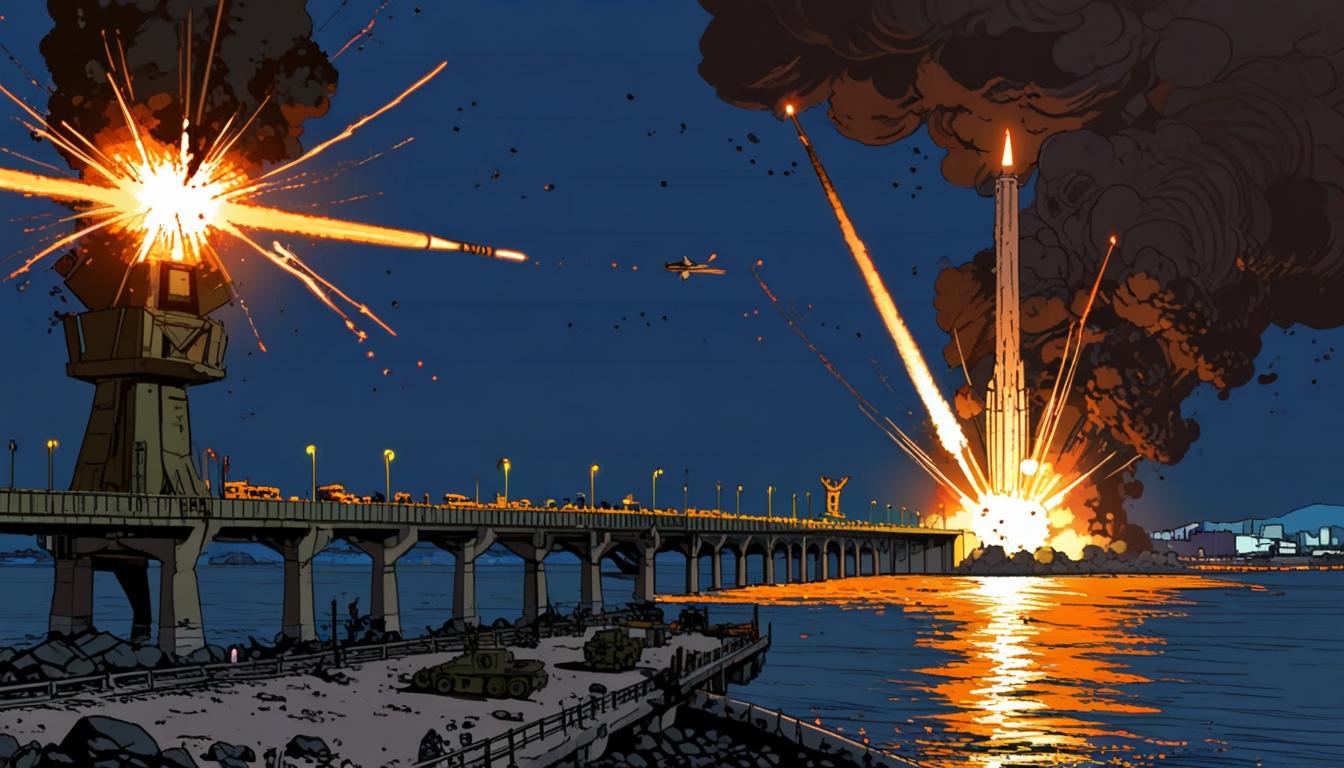Ukraine has reportedly intensified its military response against Russia, utilising British-supplied Storm Shadow missiles and kamikaze drones in a series of significant strikes that marks the heaviest offensive in months. Key targets included the strategically important Crimean Bridge, valued at approximately £3 billion, along with Russian naval and commercial assets in the area.
Throughout the night, Ukrainian forces executed multiple attacks including on the port city of Novorossiysk, which has been identified as a primary target for these missile strikes. Reports indicate that the strikes resulted in massive explosions across Russia’s Krasnodar region, where President Vladimir Putin is known to maintain several residences. Additionally, signs of destruction were noted in the Rostov region and on the occupied Crimean peninsula. Russian authorities claimed to have intercepted 170 drones along with a number of unmanned attack boats and missiles, yet the precise impact of the Ukrainian assault remained uncertain.
Sergei Markov, director of Russia’s Institute of Political Studies, stated, “For the first time since January, the Ukrainian Armed Forces launched a strike with British Storm Shadow missiles on internationally recognised territory of Russia, on Novorossiysk.” He pointed out that the Ukrainian military would require access to satellite technology, typically controlled by the United States, to effectively guide these missiles against Russian territory. This has led to speculation that recent agreements, dubbed the “Mineral Deal,” may signify a shift in US involvement, with the potential for renewed military coordination under the Biden administration’s policies.
Despite the heavy bombardment, Russian sources reported extensive military countermeasures, claiming to have shot down numerous incoming drones and missiles. However, civilian infrastructure in Novorossiysk suffered damage, and reports suggested injuries among residents, including children, due to fallen debris.
The broader context sees increasing tensions as Ukrainian President Volodymyr Zelensky pushes back against Russian military actions characterised by assaults on civilian areas, including a bombardment in the city of Kharkiv that left 44 people injured. Zelensky described the strikes as “monstrous” and asserted that they specifically target civilians during vulnerable periods, such as nighttime. “Only monsters can give such orders and carry them out,” he stated, emphasising the need for enhanced air defence support from international allies.
In light of ongoing hostilities, US officials are starting to discuss potential new sanctions against Russia that would focus on its vital energy and banking sectors, aiming to limit funding sources for the conflict. These proposals await approval from former President Donald Trump, who has recently re-engaged with strategies initially opposed during his previous term.
Meanwhile, Zelensky clarified Ukraine’s position regarding safety assurances for foreign guests at an upcoming Russian commemorative event, asserting, “We cannot be responsible for what is happening on the territory of the Russian Federation.” He highlighted concerns over potential threats that could arise during such international gatherings, suggesting Ukraine’s stance on security remains firmly non-committal.
Planned future operations and any additional military actions will likely depend on both Ukrainian defensive needs and responses to ongoing Russian aggression, as both sides grapple with the complexities of a protracted and devastating conflict.
Source: Noah Wire Services
